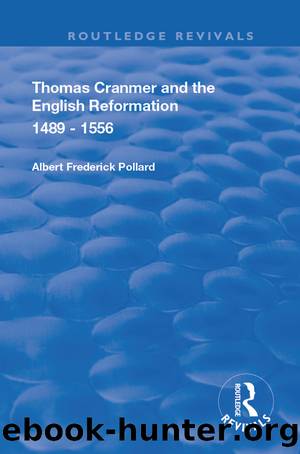Thomas Cranmer and the English Reformation 1489-1556 by Albert Frederick Pollard

Author:Albert Frederick Pollard [Pollard, Albert Frederick]
Language: eng
Format: epub
ISBN: 9781498088862
Google: 69vyoAEACAAJ
Publisher: Literary Licensing, LLC
Published: 2014-03-15T01:38:35+00:00
Another of Bullingerâs correspondents excepted Cranmer and Latimer from the bulk of the learned and the nobility who shared Zwinglian views. âAs to Canterbury,â he continued, âhe conducts himself in such a way ⦠that the people do not think much of him and the nobility regard him as lukewarm. In other respects he is a kind and good-natured man.â3 These complaints were merely due to the restraint which Cranmer placed upon himself and to his reluctance to enunciate private opinions before he could adopt them in public practice. For in reality at least one phrase in his translation of the Catechism indicated a departure from the Lutheran creed; and he implied in his answer to Gardiner, printed in 1551, that shortly before the publication of the Catechism he had abandoned âthat error of the real presence.â1
This union of Cranmer with the forces of popular enthusiasm and the more interested desires of the nobility made it very difficult for the Protector to hold the balance even between Anglo-Catholic and Protestant. The pressure which he told Gardiner was being put upon him from both sides in 1547 now grew very unequal, and it required some skill and some rigour to prevent dangerous friction between the two parties. The Government was keenly alive to the disruptive effects which disputes over the Eucharist had produced on the Continent; and although the English Constitution enjoyed better guarantees of stability than those of Germany or Switzerland, the fear of religious war was ever present to the minds of Englandâs rulers in the sixteenth century. In 1548 feeling was so acute that disputes whether there should be mass or not led to blows being exchanged in St. Paulâs and other London churches; and the French ambassador, probably with some exaggeration, declares that there were daily fights on the subject. If unity was to be preserved, there must be some sort of uniformity; and pending the production of one uniform order, a compromise and a standard which all should be persuaded or compelled to observe, the Council imposed silence on the disputants, especially with regard to the doctrine of the mass.1
Uniformity was the natural outcome of separation from Rome, for in an universal church there is more room for local option than in a national church, especially when that national church was anxious to define the boundaries which marked it off from the Roman church on one hand and the various Protestant churches on the other. If there was to be anything national about the church it was scarcely permissible that one diocese or one parish should approximate to the Roman use, while the next diocese or parish might follow that of Geneva, Wittenberg, or Zurich. There was more latitude in Germany, where a national system could not be said to exist either in religion or politics; but the results of German diversity scarcely recommended its adoption elsewhere. And so the progress towards uniformity began almost as soon as the connexion with Rome ceased. The Ten Articles
Download
This site does not store any files on its server. We only index and link to content provided by other sites. Please contact the content providers to delete copyright contents if any and email us, we'll remove relevant links or contents immediately.
Guns, Germs and Steel by Diamond Jared(2365)
Collapse: How Societies Choose to Fail or Succeed by Jared Diamond(1514)
The Emperor of All Maladies by Siddhartha Mukherjee(1438)
Transcendence by Gaia Vince(1139)
148424513X by Unknown(1077)
Seven Skeletons by Lydia Pyne(1067)
Civilization One by Christopher Knight(1003)
Sapiens - A brief history of humankind (Marathi) by Yuval Noah Harari(993)
The Rational Optimist: How Prosperity Evolves by Matt Ridley(965)
THE MASTER AND HIS EMISSARY by Iain McGilchrist(942)
Guns, Germs, and Steel: The Fates of Human Societies by Jared M. Diamond(928)
At Home by Bill Bryson(909)
Underworld The Mysterious Origins of Civilization by Graham Hancock(899)
How the Irish Saved Civilization by Thomas Cahill(895)
Marco Polo by Laurence Bergreen(893)
Atrocitology by Matthew White(880)
Ancient Iraq by Georges Roux(863)
The World Until Yesterday: What Can We Learn From Traditional Societies? by Jared Diamond(855)
Guns, Germs and Steel: The Fates of Human Societies by Jared Diamond(842)
